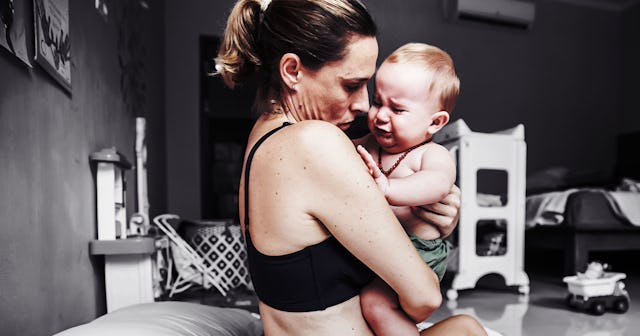COVID-19 Has Increased The Pressure On Moms To Breastfeed

I was 24 years old when I had my first baby. When I found out that I was pregnant I knew immediately that I would breastfeed and I never considered another option. I had researched it all and “knew” all the benefits from antibodies to ear infections.
When my son was born, he had a terrible latch. Then when my milk came in, I got so engorged it was almost impossible for him to nurse. I ended up with cracked, bleeding nipples and still I did not stop. I had convinced myself that I would be failing him if I didn’t continue, and so I suffered through until it got easier. Not once did anyone reassure me that even if I did choose to stop, it would be okay. So I applied pressure on myself and never let up. Now, in the age of COVID, many breastfeeding moms are feeling the same pressure.
There is a whole slew of reasons why women struggle with breastfeeding. We know this. Lack of support, lack of access to proper resources and education, and minimal (if any) paid leave top the list. Women in the U.S. return to work sooner than most countries, and many workplaces are still not equipped with adequate spaces in which to pump, and some moms just don’t want to deal with the burden of lugging around the equipment. Pumping is hard work!
There have been a number of studies since the start of the pandemic on the transfer of COVID-19 antibodies through breast milk. Recently, Dr. Rebecca Powell, along with her colleagues, conducted research that showed that the breast milk samples of 88% of women who had recovered from COVID-19 contained IgA antibodies. In most cases, these were capable of neutralizing Sars-CoV-2, meaning they could block infection. Now with the most recent health alert released from the CDC urging pregnant and breastfeeding women to get vaccinated against the virus, even more women will (assuming they get vaccinated) possess the antibody containing liquid gold.
This is good news, right?
Peter Dazeley/Getty
I mean, I guess in a sense it’s amazing news. As a now 31-year-old mom of three, who has recovered from COVID-19 and is extremely comfortable in my breastfeeding journey, it’s nice to know this time around that our bodies are providing our babies with some protection. But 24-year-old me, with the cracked, bleeding nipples and postpartum anxiety? Probably could not have handled breastfeeding through pandemic times, and she would have appreciated someone telling her that was okay!
While most doctors acknowledge that “fed is best,” I cannot help but notice the twinkle in the pediatrician’s eye whenever we discuss breastfeeding. Our hospital and their doctors’ office HIGHLY encourage it. And when I struggled the first time around, I was never once offered the option of using formula. The pediatrician walked me right down the hall to a lactation consultant where we worked together to “fix the problem.” I can only imagine what it’s like to struggle to breastfeed in COVID times when leaving the house with a newborn feels extra risky, and when many offices are short-staffed and it can take weeks (or longer) to get an appointment.
I’m pausing here to acknowledge that some folks just do not want to (or can’t) breastfeed, and that’s a perfectly valid choice.
The regular societal pressure to breastfeed because it’s “the best thing to do” is now coupled with an extra layer of worry. Those thoughts can be all-consuming for moms, especially if postpartum depression or anxiety is taking root.
If don’t breastfeed and my baby gets sick, it’ll be my fault. I could have given them antibodies via my breastmilk that could help keep them safe.
If I struggle and quit and something happens, I’m going to regret not trying even harder.
If I can’t nurse, I can pump. If I can’t pump, I can hand express. EVERY SINGLE DROP counts.
The rate of children under 12 requiring hospital care if they contract the virus is much lower than adults. But am I willing to leave it up to chance? I cannot let my baby be on the “bad” end of the statistic.
As soon as we become parents, it’s almost like a switch flips in our brains and our needs no longer come first. We become obsessed with what is best for our babies while often forgetting we need to be our best selves in order to care for anyone else. While I do appreciate the factual. scientific information that is coming out surrounding COVID-19, the vaccine, and breastfeeding, I don’t think moms need any more pressure. We’re already at our wits’ end and doing our very best.
This article was originally published on